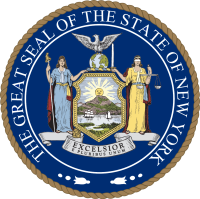New York State Prison Inspector
The Inspector of State Prisons was a statewide elective office created by the New York State Constitution of 1846. At the 1847 New York state election, three Inspectors were elected and then, upon taking office, so classified that henceforth every year one Inspector would be elected to a three-year term. The Prison Inspectors appointed wardens and keepers and supervised the prison administration in general. They were required to visit jointly four times a year each one of the state prisons. Besides, each one of the Inspectors was allotted the special care to one of the then existing three state prisons (Auburn State Prison, Sing Sing State Prison and Clinton State Prison) where he had to attend to business for at least one week per month.
In 1876, a constitutional amendment abolished the office of State Prison Inspector, pending the appointment of a New York Superintendent of State Prisons who would take over the duties of the Prison Inspectors. The first Superintendent was Louis D. Pilsbury, appointed by Governor Lucius Robinson on February 17, 1877.
List of Inspectors of State Prisons
| Name | Took office | Left office | Party | Notes |
|---|---|---|---|---|
| John B. Gedney | January 1, 1848 | December 31, 1848 | Whig | drew the one-year term |
| Isaac N. Comstock | January 1, 1848 | December 31, 1849 | Whig | drew the two-year term |
| David D. Spencer | January 1, 1848 | December 31, 1850 | Whig/Anti-Rent | drew the three-year term |
| Alexander H. Wells | January 1, 1849 | December 31, 1851 | Whig | |
| Darius Clark | January 1, 1850 | December 31, 1855 | Democratic | two terms; elected on the Democratic and Anti-Rent tickets in 1849, on the Democratic ticket in 1852 |
| William P. Angel | January 1, 1851 | December 31, 1853 | Democratic/Anti-Rent | |
| Henry Storms | January 1, 1852 | December 31, 1854 | Democratic | |
| Thomas Kirkpatrick | January 1, 1854 | December 31, 1856 | Whig | |
| Norwood Bowne | January 1, 1855 | December 31, 1857 | Whig/Anti-Nebraska/Anti-Rent | |
| William A. Russell | January 1, 1856 | December 31, 1858 | American | |
| Wesley Bailey | January 1, 1857 | December 31, 1859 | Republican | |
| William C. Rhodes | January 1, 1858 | December 31, 1860 | Democratic | |
| Josiah T. Everest | January 1, 1859 | December 31, 1861 | Republican | |
| David P. Forrest | January 1, 1860 | December 31, 1862 | Republican | |
| James K. Bates | January 1, 1861 | December 31, 1866 | Republican | two terms; elected on the Republican ticket in 1860, on the Union ticket in 1863 |
| Abraham B. Tappen | January 1, 1862 | December 31, 1864 | Union | elected on the Independent People's and Republican tickets |
| Gaylord J. Clarke | January 1, 1863 | December 31, 1865 | Democratic | |
| David P. Forrest | January 1, 1865 | December 31, 1867 | Union | second term |
| Henry A. Barnum | January 1, 1866 | December 31, 1868 | Republican | |
| John Hammond | January 1, 1867 | December 31, 1869 | Republican | |
| Solomon Scheu | January 1, 1868 | December 31, 1873 | Democratic | two terms |
| David B. McNeil | January 1, 1869 | December 31, 1871 | Democratic | |
| Fordyce L. Laflin | January 1, 1870 | December 31, 1872 | Democratic | |
| Thomas Kirkpatrick | January 1, 1872 | December 31, 1874 | Republican | second term |
| Ezra Graves | January 1, 1873 | December 31, 1875 | Republican | |
| Moss K. Platt | January 1, 1874 | March 1, 1876 | Republican | died in office |
| George Wagener | January 1, 1875 | February 17, 1877 | Democratic | legislated out of office by Amendment of 1876, office taken over by Superintendent of State Prisons |
| Rodney R. Crowley | January 1, 1876 | February 17, 1877 | Democratic | legislated out of office by Amendment of 1876, office taken over by Superintendent of State Prisons |
| Benjamin S. W. Clark | March 2, 1876 | December 31, 1876 | Democratic | appointed to fill vacancy in place of Platt |
| Robert H. Anderson | January 1, 1877 | February 17, 1877 | Democratic | legislated out of office by Amendment of 1876, office taken over by Superintendent of State Prisons |
References
Further reading
- The New York Civil List compiled by Franklin Benjamin Hough (pages 45f; Weed, Parsons and Co., 1858)
- The New York Civil List compiled by Franklin Benjamin Hough, Stephen C. Hutchins and Edgar Albert Werner (1867; pages 410f)
